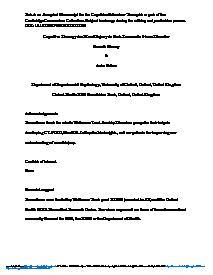Cognitive Therapy for Moral Injury in Post-Traumatic Stress Disorder
Moral injury is the profound psychological distress which can arise following participating in, or witnessing, events which transgress an individual’s morals and include harming, betraying, or failure to help others, or being subjected to such events, e.g. being betrayed by leaders. It has been primarily researched in the military, but it also found in other professionals such as healthcare workers coping with the COVID-19 pandemic and civilians following a wide range of traumas.
In this article, we describe how to use cognitive therapy for PTSD (CT-PTSD) to treat patients presenting with moral injury-related PTSD. We outline the key techniques involved in CT-PTSD and describe their application to treating patients with moral injury-related PTSD. A case study of a healthcare worker is presented to illustrate the treatment interventions.
Geachte bezoeker,
De informatie die u nu opvraagt, kan door psychotraumanet niet aan u worden getoond. Dit kan verschillende redenen hebben,
waarvan (bescherming van het) auteursrecht de meeste voorkomende is. Wanneer het mogelijk is om u door te verwijzen naar de bron
van deze informatie, dan ziet u hier onder een link naar die plek.
Als er geen link staat, kunt u contact opnemen met de bibliotheek,
die u verder op weg kan helpen.
Met vriendelijke groet,
Het psychotraumanet-team.
In: Cognitive Behaviour Therapist ; ISSN: 1754-470X | 14 | E8
https://doi.org/10.1017/s1754470x21000040


